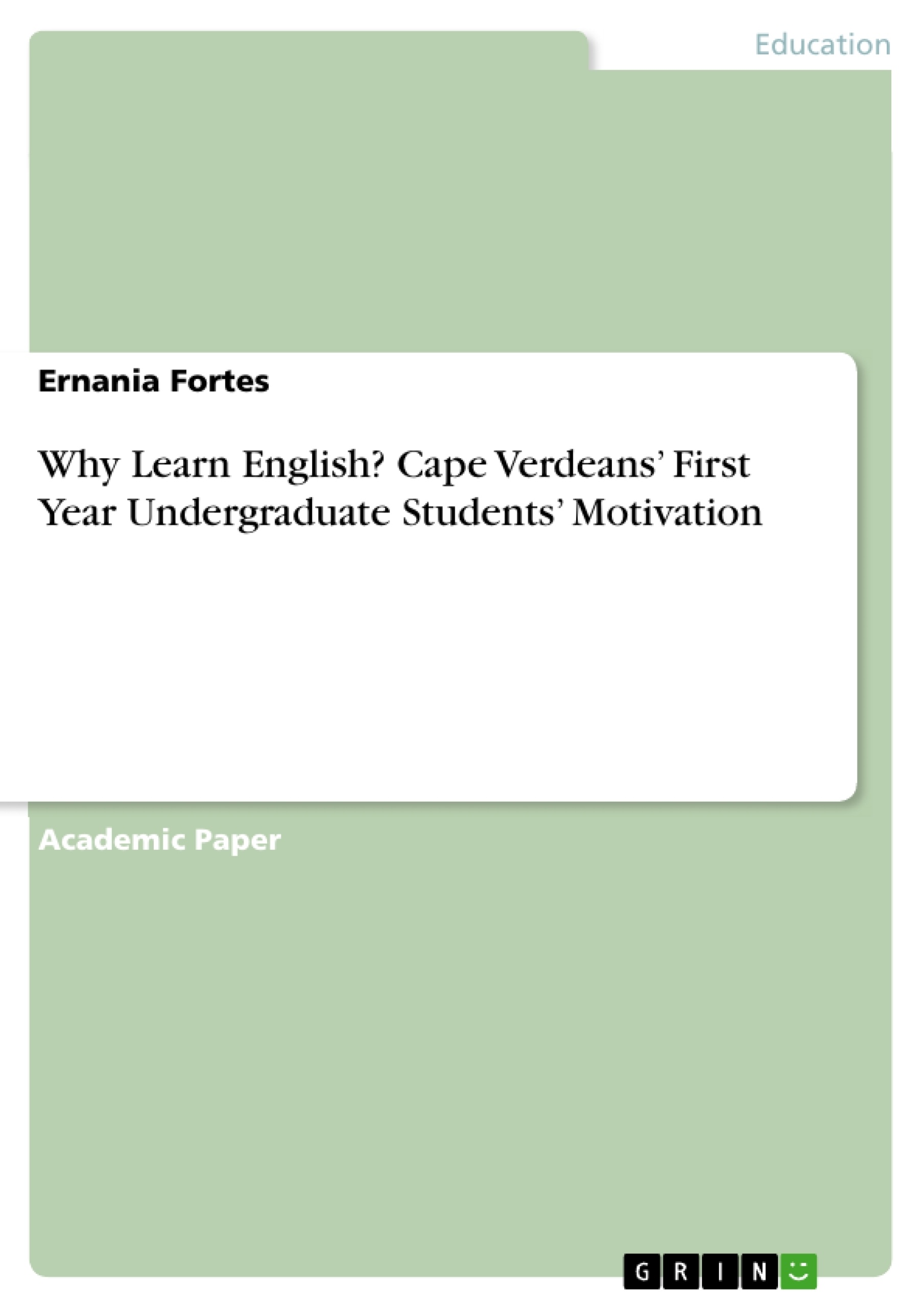The purpose of this study is to identify what motivates the 1st year Undergraduate students from a public University located at the center of Mindelo City in Cape Verde to learn English as a foreign language.
Motivation is a relevant requisite in learning a foreign language, and is an issue that has been discussed by many educators since it appears absent in many students and so present in others.
Furthermore, this paper will also address what is the particular influence of Mindelo tourism in the students’ motivation and if the motivations presented contribute with their learning outcomes in English language. Twenty 1st year undergraduate students of English Studies from the University of Cape Verde in the city of Mindelo, Cape Verde, participated in this study. There were 8 females and 12 male student participants, with an age range from 19 to 31 years old. Having in mind the purpose of this study, this research focused on qualitative data collection and the data was collected through questionnaire and semi structured interviews.
After analysing and discussing the obtained data, the results suggest that the participants of this study display an extrinsic and instrumental motivation, since it is the region's tourism that influences the motivation of these students in a positive way to the English learning, resulting in a good general performance of these students.
Inhaltsverzeichnis (Table of Contents)
- CHAPTER I – INTRODUCTION
- THE RESEARCHER
- STATEMENT OF THE PROBLEM
- CHAPTER II –LITERATURE REVIEW
- LITERATURE REVIEW
- CHAPTER III- METHODOLOGIES
- SAMPLE POPULATION
- UNIVERSITY
- TOTAL POPULATION
- PLAN FOR DATA ANALYSIS
- CHAPTER IV – DATA ANALYSIS
- CONCLUSION
- REFERENCES
Zielsetzung und Themenschwerpunkte (Objectives and Key Themes)
This research project aims to determine what motivates first-year undergraduate students at a public university in Mindelo City, Cape Verde, to learn English as a foreign language. It explores the influence of Mindelo's tourism on student motivation and investigates whether these motivations contribute to their English language learning outcomes.
- Motivation of first-year undergraduate students in learning English as a foreign language.
- The role of Mindelo's tourism in student motivation.
- The relationship between motivation and English language learning outcomes.
- The importance of understanding and utilizing student motivation in the classroom.
- The influence of teachers on student motivation and learning.
Zusammenfassung der Kapitel (Chapter Summaries)
Chapter I: Introduction
This chapter introduces the researcher, a Capeverdean English professor pursuing a doctorate in Education. The author's background and passion for teaching English are highlighted, emphasizing their commitment to student success. The chapter establishes the research problem by focusing on the importance of motivation in the classroom and defining the research questions.
Chapter II: Literature Review
This chapter provides an overview of existing research on motivation in the classroom, particularly within the context of foreign language learning. The chapter analyzes different perspectives on motivation, emphasizing the importance of understanding the concept itself and its impact on learning outcomes.
Chapter III: Methodologies
This chapter delves into the methodology used to collect and analyze data. It outlines the sample population, including the university and total number of students involved. The chapter also explains the plan for data analysis, setting the stage for the interpretation of results.
Schlüsselwörter (Keywords)
The primary focus of this work is on student motivation in the context of English as a foreign language learning. The research explores key concepts such as motivation, tourism, learning outcomes, and the role of teachers. The study aims to contribute to a deeper understanding of student motivation in the classroom and its impact on academic success.
Frequently Asked Questions
What motivates Cape Verdean students to learn English?
The study suggests that students display primarily extrinsic and instrumental motivation, driven by practical goals and external factors.
How does tourism in Mindelo influence student motivation?
Tourism in the region has a positive influence on students, as they see English as a necessary tool for future employment and interaction within the tourism sector.
Who participated in this research?
The participants were twenty 1st-year undergraduate English Studies students (8 females, 12 males) from a public university in Mindelo, aged 19 to 31.
What methodology was used for the data collection?
The researcher used a qualitative approach, collecting data through questionnaires and semi-structured interviews.
Does higher motivation lead to better learning outcomes?
Yes, the results indicate that the positive influence of tourism-related motivation results in a good general academic performance for these students.
Why is understanding motivation important for teachers?
Understanding what motivates students allows teachers to tailor their lessons and create a more engaging and effective learning environment.
- Arbeit zitieren
- Ernania Fortes (Autor:in), 2016, Why Learn English? Cape Verdeans’ First Year Undergraduate Students’ Motivation, München, GRIN Verlag, https://www.grin.com/document/495197



